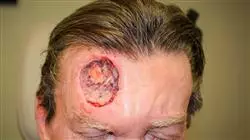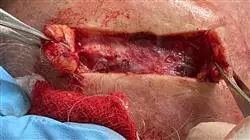University certificate
The world's largest faculty of medicine”
Introduction to the Program
With this Professional master’s degree you will be able to improve your knowledge of the latest diagnostic and treatment techniques for the different types of Skin Cancer "

In recent years, Skin Cancer has experienced a worrying increase in its incidence. This is due to prolonged exposure to ultraviolet radiation from the sun, environmental and genetic factors. In this aspect, the early detection of Skin Cancer is crucial for a successful treatment and to improve the survival rates of patients. For this reason, it is essential that the specialist is constantly informed about this disease, in order to introduce the most wellknown advances in its therapeutics and under the maximum scientific rigor.
For this reason, TECH has created this degree that will provide a high-level education to the health professional in the latest diagnostic advances and treatment techniques used in Skin Cancer . During a period of 12 months of study, the graduate will deepen in the different types of surgery used to address this disease, such as curettage and electrocoagulation.
Students will also learn about the various techniques for the evaluation and detection of cancer, such as sentinel lymph node biopsy and photodynamic therapy. In addition, thanks to the quality multimedia content, students will delve into the topical treatments used for cutaneous cancer such as 5-fluorouracil and imiquimod.
Consequently, this Professional master’s degree gives professionals the opportunity to access a quality, flexible program that allows them to combine it with their daily activities by not having to attend classroom classes, nor to have classes with restricted schedules. In addition, this modality, combined with the Relearningmethod, will allow the specialist to review the most important concepts in a more efficient way and without requiring extensive hours of study.
You will delve into the molecular basis of melanoma, covering the genetic modifications and signaling pathways involved in its progression"
This Professional master’s degree in Skin Cancer contains the most complete and up-to-date scientific program on the market. The most important features include:
- The development of case studies presented by experts in Dermatology, Oncology and Plastic and Reconstructive Surgery
- The graphic, schematic, and practical contents with which they are created, provide scientific and practical information on the disciplines that are essential for professional practice
- Practical exercises where self-assessment can be used to improve learning
- Its special emphasis on innovative methodologies
- Theoretical lessons, questions to the expert, debate forums on controversial topics, and individual reflection assignments
- Content that is accessible from any fixed or portable device with an Internet connection
You will incorporate in your medical practice the most recent surgical techniques and photodynamic therapies for the approach of Basal Cell Carcinoma"
The program’s teaching staff includes professionals from sector who contribute their work experience to this educational program, as well as renowned specialists from leading societies and prestigious universities.
Its multimedia content, developed with the latest educational technology, will provide the professional with situated and contextual learning, i.e., a simulated environment that will provide an immersion education programmed to learn in real situations.
The design of this program focuses on Problem Based Learning, through which the students will try to solve the different situations of professional practice that will be presented to them throughout the academic course. For this purpose, the student will be assisted by an innovative interactive video system created by renowned experts.
You will gain additional skills in the evaluation of Merkel cell carcinoma lesions based on the latest scientific evidence"

With this degree you will delve into the mechanisms of squamous cell carcinoma and emerging therapeutic techniques"
Why study at TECH?
TECH is the world’s largest online university. With an impressive catalog of more than 14,000 university programs available in 11 languages, it is positioned as a leader in employability, with a 99% job placement rate. In addition, it relies on an enormous faculty of more than 6,000 professors of the highest international renown.

Study at the world's largest online university and guarantee your professional success. The future starts at TECH”
The world’s best online university according to FORBES
The prestigious Forbes magazine, specialized in business and finance, has highlighted TECH as “the world's best online university” This is what they have recently stated in an article in their digital edition in which they echo the success story of this institution, “thanks to the academic offer it provides, the selection of its teaching staff, and an innovative learning method aimed at educating the professionals of the future”
A revolutionary study method, a cutting-edge faculty and a practical focus: the key to TECH's success.
The most complete study plans on the university scene
TECH offers the most complete study plans on the university scene, with syllabuses that cover fundamental concepts and, at the same time, the main scientific advances in their specific scientific areas. In addition, these programs are continuously being updated to guarantee students the academic vanguard and the most in-demand professional skills. In this way, the university's qualifications provide its graduates with a significant advantage to propel their careers to success.
TECH offers the most comprehensive and intensive study plans on the current university scene.
A world-class teaching staff
TECH's teaching staff is made up of more than 6,000 professors with the highest international recognition. Professors, researchers and top executives of multinational companies, including Isaiah Covington, performance coach of the Boston Celtics; Magda Romanska, principal investigator at Harvard MetaLAB; Ignacio Wistumba, chairman of the department of translational molecular pathology at MD Anderson Cancer Center; and D.W. Pine, creative director of TIME magazine, among others.
Internationally renowned experts, specialized in different branches of Health, Technology, Communication and Business, form part of the TECH faculty.
A unique learning method
TECH is the first university to use Relearning in all its programs. It is the best online learning methodology, accredited with international teaching quality certifications, provided by prestigious educational agencies. In addition, this disruptive educational model is complemented with the “Case Method”, thereby setting up a unique online teaching strategy. Innovative teaching resources are also implemented, including detailed videos, infographics and interactive summaries.
TECH combines Relearning and the Case Method in all its university programs to guarantee excellent theoretical and practical learning, studying whenever and wherever you want.
The world's largest online university
TECH is the world’s largest online university. We are the largest educational institution, with the best and widest online educational catalog, one hundred percent online and covering the vast majority of areas of knowledge. We offer a large selection of our own degrees and accredited online undergraduate and postgraduate degrees. In total, more than 14,000 university degrees, in eleven different languages, make us the largest educational largest in the world.
TECH has the world's most extensive catalog of academic and official programs, available in more than 11 languages.
Google Premier Partner
The American technology giant has awarded TECH the Google Google Premier Partner badge. This award, which is only available to 3% of the world's companies, highlights the efficient, flexible and tailored experience that this university provides to students. The recognition as a Google Premier Partner not only accredits the maximum rigor, performance and investment in TECH's digital infrastructures, but also places this university as one of the world's leading technology companies.
Google has positioned TECH in the top 3% of the world's most important technology companies by awarding it its Google Premier Partner badge.
The official online university of the NBA
TECH is the official online university of the NBA. Thanks to our agreement with the biggest league in basketball, we offer our students exclusive university programs, as well as a wide variety of educational resources focused on the business of the league and other areas of the sports industry. Each program is made up of a uniquely designed syllabus and features exceptional guest hosts: professionals with a distinguished sports background who will offer their expertise on the most relevant topics.
TECH has been selected by the NBA, the world's top basketball league, as its official online university.
The top-rated university by its students
Students have positioned TECH as the world's top-rated university on the main review websites, with a highest rating of 4.9 out of 5, obtained from more than 1,000 reviews. These results consolidate TECH as the benchmark university institution at an international level, reflecting the excellence and positive impact of its educational model.” reflecting the excellence and positive impact of its educational model.”
TECH is the world’s top-rated university by its students.
Leaders in employability
TECH has managed to become the leading university in employability. 99% of its students obtain jobs in the academic field they have studied, within one year of completing any of the university's programs. A similar number achieve immediate career enhancement. All this thanks to a study methodology that bases its effectiveness on the acquisition of practical skills, which are absolutely necessary for professional development.
99% of TECH graduates find a job within a year of completing their studies.
Professional Master's Degree in Skin Cancer
In the field of medicine, specialization is essential to provide the best care to patients. At TECH Global University, we are committed to academic excellence and constant updating in the most specialized medical areas. Therefore, we present you our outstanding Professional Master's Degree in Skin Cancer, a program designed for those professionals who wish to become experts in dermatologic oncology and make a difference in the fight against this disease. Skin cancer is one of the most frequent neoplasms worldwide, affecting people of all ages. Early detection and appropriate treatment are essential to improve the prognosis of patients. This is why our university has developed a comprehensive and updated program, focused on providing the necessary tools and knowledge to address skin cancer effectively. One of the main advantages of our Professional Master's Degree is that it is taught online, which allows you to access quality education from the comfort of your home or anywhere with an Internet connection.
Become an expert in Dermatologic Oncology with TECH
Our teaching team is composed of highly trained professionals with extensive experience in the field of dermatologic oncology. Their theoretical and practical knowledge will provide you with a complete and up-to-date view of the most recent medical advances in the treatment of skin cancer. During the Professional Master's Degree, special attention will be paid to new therapeutic approaches, the use of targeted therapies and immunotherapy in the approach to this disease. You will also be trained in early diagnosis, detection of malignant lesions and implementation of effective preventive measures. If you are looking to excel in the medical field and contribute to the well-being of skin cancer patients, the Professional Master's Degree in Skin Cancer is your best option. Don't miss the opportunity to become an expert in dermatologic oncology, taking your medical career to the next level. enroll now and together let's face the challenge of skin cancer with knowledge and dedication!







